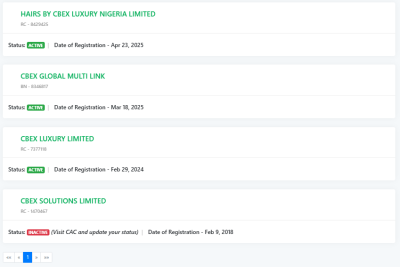Emerging information indicates that the Economic and Financial Crimes Commission (EFCC)’s declaration of Elie Bitar, a Lebanese national, as a wanted man over the CBEX ponzi scheme may have been wrong, FIJ can report.
In April, Crypto Bridge Exchange (CBEX), a deceptive cryptocurrency scheme, shut down with billions of Nigerian investors’ funds. Public outcry followed and the EFCC launched an investigation with a promise to recoup some of the lost funds.
Before the EFCC took action, FIJ had exposed some local promoters of the CBEX scheme that falsely promised subscribers 100% returns on investments monthly. Subsequently, a court granted the Ola Olukoyede-led EFCC an order to arrest persons, including four of the promoters FIJ had exposed, connected to the deceit.
On April 30, the anti-graft commission placed Bitar on its wanted list in connection with the large-scale CBEX fraud.
“The public is hereby alerted that ELIE BITAR, whose photograph appears above is wanted by the Economic and Financial Crimes Commission (EFCC) for fraud allegedly perpetrated on an online platform called Crypto Bridge Exchange (CBEX),” a bulletin signed by Dele Oyewale, the spokesperson for the agency, read.
“Bitar is 41 years old and his last known address is at Eng. George Enemoh Crescent, Lekki Phase 1, Lekki, Lagos State.”
Crypto Bridge Exchange as a business or company name was unregistered. Rather it was flouted by ST Technologies International Ltd, a company registered with the Corporate Affairs Commission (CAC) and certified by the EFCC as a non-financial company.
By declaring Bitar wanted, the public expectation was that the anti-corruption agency had established a valid case against him and should have some questions to answer.
FIJ’s latest findings strongly suggest that putting Bitar on the wanted list over CBEX fraud was an embarrassing mistake by the EFCC. Available evidence suggests he played no role in the financial hoax.
Although he held the largest shares in the company, an entity that focused on conducting retail studies for fast moving consumer goods (FMCG) companies, Bitar co-founded CBEX Solutions Limited with one Abdulkadri Yakubu on February 9, 2018, with company number 1470467, according to the data obtained from the Corporate Affairs Commission (CAC)’s portal.
FIJ learnt that the company’s clients included Ekulo Group of Companies and Distell Wines and Spirits Nigeria Limited, both of which were beverage companies.
FIJ could not reach Distell as it was recently acquired by the Nigerian Breweries Plc. For Ekulo, efforts to get its comments on this story were unsuccessful. Its public phone line was not connecting and an email sent on Monday was not responded to at press time.
Curiously, the EFCC did not declare Bitar’s partner Yakubu wanted.
CBEX, when used as a search prompt on the CAC portal, popped up details for three companies and one business entity, Bitar’s CBEX Solutions Limited being the oldest. Others were registered between February 2024 and March 2025.

In the wake of the COVID-19 pandemic and its attendant disruptions to businesses, Bitar’s company was closed down in 2020 and has remained inoperative since then. Its operational status on the CAC portal was “inactive” at press time.
ORIGIN OF ‘CBEX’ IN BITAR’S COMPANY
While the fraudulent CBEX is an acronym for Crypto Bridge Exchange, Bitar’s company got its name from the combination of his initials and those of Xavier Carbonel, his business partner.
The first alphabets in Elie Bitar and Xavier Carbonel formed the CBEX in CBEX Solutions Limited, according to an authoritive source.
Both individuals have other concerns. While Bitar owns Smarterise Integrated Solutions Limited, an energy company operating in Lagos; Carbonel is a managing director at Bboxx RDC, a London-based business-financing company.

According to Carbonel’s LinkedIn profile, he was formerly an investor and board member at the Lagos-based 63 Web Studio. He was also a former vice president of sales at Jumia, an African e-commerce store.
MISTAKEN IDENTITY
The news of Bitar’s current status as a wanted man in Nigeria sent shivers down his spine, impacting his reputation and family.
In a letter written on Friday and submitted to its Lagos office on the same day, Bitar had pointedly demanded that the EFCC strike out his name from the wanted list and tender a published apology to that effect. FIJ saw a copy of the letter.
“Elie Bitar, whose photograph appears in the online official bulletin issued by the EFCC, is a man of repute and has no affiliation, partnership, or association, formal or informal, with the Crypto Bridge Exchange (CBEX) referenced in the online official bulletin issued by the EFCC,” Femi Agunbiade, a partner at CHAPITRE LLP, a Lagos-based law firm, wrote in the letter.
“It is important to note that CBEX solutions was focused on performing retails studies for FMCG companies, such as Distell or Ekulo, distributors in Nigeria. It had its last paying customer in May 2020, and as Covid hit, the company was made dormant a few months later and has not been operating since year 2020.
“Elie Bitar has no connection whatsoever to the Crypto Bridge Exchange (CBEX) in question and the online official bulletin issued by the EFCC has tremendously defamed him worldwide with adverse direct impact on his business, customers, and his team being harassed, etc.
“While it is within the ambit of the EFCC to investigate the cryptocurrency fraud linked to the online trading platform called Crypto Bridge Exchange (CBEX), the online official bulletin issuec by the EFCC on Elie Bitar are false, inaccurate, and perhaps a mistake on the part of EFCC which should be remedied immediately to avoid bringing the name of the Commission into disrepute.”
Bitar’s lawyers believe the EFCC did a poor job before going public with the bulletin, saying it was a case of mistaken identity for which the commission had to publicly apologise to avoid a full-blown court litigation.
“In view of the foregoing, we demand that the online official bulletin issued by the EFCC which declares Elie Bitar as wanted in connection with an investigation related to a fraud case involving Crypto Bridge Exchange (CBEX) be pulled down immediately followed by another online official bulletin issued by the EFCC apologising to Elie Bitar for the mistaken identity,” Bitar’s legal representative wrote.
“Be informed that consequent upon the failure of EFCC to comply within seven (7) days of receipt of this letter, we shall invoke every legal means permissible under the law to seek appropriate redress without further recourse to EFCC.”
Attached to the letter were company registration documents, bank statements and invoices showing business activities of Bitar’s company and proof of remittance of VAT to the Federal Inland Revenue Service (FIRS).
A source familiar with the matter said the EFCC had the opportunity to invite or call Bitar to offer clarifications on the nature of his business before declaring him wanted but chose not to.
Dele Oyewale, the spokesperson for the agency, did not respond to a list of questions sent to his two known phone lines as a text and on WhatsApp on Sunday. When FIJ called him via WhatsApp on Monday, he said “I am at a conference.” FIJ told him that the call was a follow-up to the message earlier sent to him.
All follow-up calls and reminders had received no response at press time.
The agency acknowledged the receipt of the same set of questions emailed to it on Monday. “This is to acknowledge the receipt of your mail,” it said without answering the questions or giving a timeframe within which its response would be sent. (FIJ)


